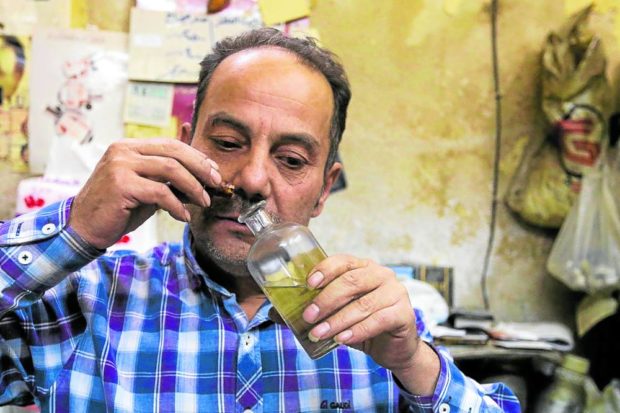
Syrian perfumer Mohammad al-Masri works at his shop in a historic souq of Damascus’s old city on October 31, 2022. – One whiff of a fragrance is all al-Masri needs to recreate the scents of luxury brands, for a fraction of the cost. Dozens of customers flock daily to his tiny store in Damascus’s old city, many flashing photos on their phones of high-end perfumes they want to replicate. “All I have is my shop, and this nose I’ve been training since I was 15,” the 55-year-old told AFP, pointing at his nose. (Photo by LOUAI BESHARA / AFP)
DAMASCUS—One whiff of a fragrance is all Syrian perfumer Mohammad al-Masri needs to recreate the scent of a luxury brand—without the label and for a fraction of the cost.
Dozens of customers flock daily to his tiny store, nestled in the historic market of Damascus’ old city, many flashing photos on their phones of high-end perfumes they want to replicate.
READ: Nose for style: Paris launches major perfume museum
“All I have is my shop, and this nose I’ve been training since I was 15,” the 55-year-old told Agence France-Presse (AFP), pointing at his face. “I don’t have a big workshop or high-end equipment.”
After 11 years of brutal war and economic dislocation, most Syrians struggle to afford life’s bare necessities, let alone perfume.
Before the war, Masri would mostly concoct expensive oriental fragrances, with heavy notes of oud, a sweet and woody scent, like his family has done for a century.
But after Syria plunged into conflict, demand for cheap imitations of premium brands skyrocketed and Masri’s shop walls are filled with pictures of world-famous perfumes.
“For young women, perfume is essential, it’s like food or water,” said 24-year-old customer Cham al-Falah.
“I used to buy Western perfumes but I can no longer afford them because imported products are becoming increasingly hard to come by in Syria,” she said while ordering a fragrance imitating her favorite Italian perfume.
Although Damascus has been spared the worst destruction of the war, which began after its government repressed peaceful protests, the local currency has lost almost 99 percent of its value on the parallel market.
Syrian employees and civil servants reportedly make roughly $25 a month on average—a quarter of the price of a bottle of imported perfume.
Masri sells his fragrances for about $6, drawing in a flow of clients from all walks of life.